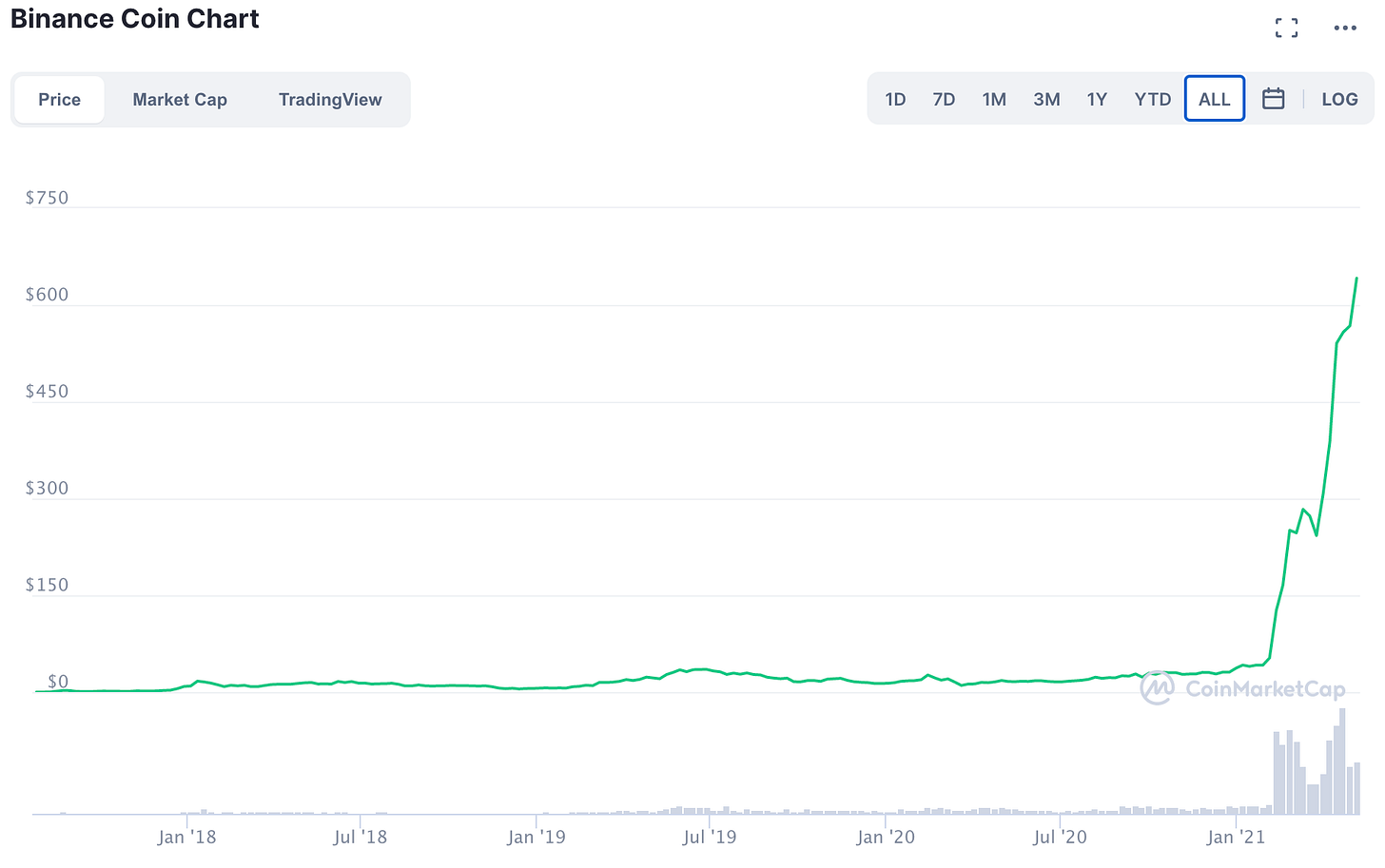Mark Cuban would like you to buy DOGE
(and then give it to him)
In this issue:
Regulatory competition is an American strength
Mark Cuban would like you to buy DOGE and give it to him
How much decentralization is enough
Regulatory competition is an American strength
U.S. Supreme Court Justice Louis Brandeis wrote in an opinion: "It is one of the happy incidents of the federal system that a single courageous State may, if its citizens choose, serve as a laboratory; and try novel social and economic experiments without risk to the rest of the country."1 It is one of America’s great strengths that as states take different approaches to the same policy issues they are effectively A/B testing different governments in real time.
Cryptocurrencies are a great way to observe this kind of democratic Monte Carlo simulation in action. New York for example took a cautious, regulatory approach designed to protect consumers and the existing finance industry. So the New York Department of Financial Services passed the BitLicense in 2015 that regulated any business with a New York customer and a cryptocurrency component as though it were a bank. To a man with a hammer everything looks like a nail, to the center of the global finance industry everything looks like a bank. More recently they have moved to outlaw Bitcoin mining in the state for the next three years to allow the government time to "assess the impact on the environment."
New York’s approach is pretty typical of what people imagine government response to cryptocurrency will be, but it is certainly not the only possible strategy. As the tweet above implies, Mayor Suarez of Miami is actively courting cryptocurrency businesses to locate to Miami. He is currently leading efforts to allow Miami citizens to pay taxes in crypto, to allow state employees to be paid in crypto and to keep a portion of the city’s treasury in crypto. Where New York sees a threat to its existing financial industry, Miami sees an opportunity to create a new one.
Other states are taking different approaches of their own. Wyoming has reformed its banking laws to support self-custody of funds, legal status for decentralized autonomous organizations (DAOs) and prevent rehypothecation of cryptocurrencies. On Thursday Kentucky enacted a pair of bills that offered various tax breaks to cryptocurrency miners in an effort to attract them to the state. Texas is also trying to draw miners in with friendly regulation and inexpensive, renewable power. Louisiana even passed a resolution formally commending Bitcoin and Satoshi, which is basically meaningless but still very nice of them.
Mark Cuban would like you to buy DOGE and give it to him
At time of writing Dogecoin is trading at ~$0.65/DOGE, with a market cap of ~$84B. There are 10,000 new DOGE minted every minute, which means to maintain current prices Dogecoin enthusiasts will need to buy ~$9.2M worth of DOGE per day, roughly ~$3.3B/year. At ~$84B Dogecoin is the fourth largest cryptocurrency by market cap. By way of comparison the current market cap of Coinbase is ~$54B. Litecoin (the network that secures Dogecoin) is the 10th largest cryptocurrency with a market cap of roughly ~$23B.2 The codebase has had no meaningful development work since 2018 and the network is run by ~900 nodes. The top 100 addresses control ~2/3rds of the supply.
On the other hand Mark Cuban says Dogecoin will definitely hit $1 as long as enough of us buy Mavericks merchandise. It’s a team effort!
How much decentralization is enough
The purpose of a cryptocurrency - at least in theory - is decentralization. The reason decentralization matters is because the more centralized a system is the easier it is to control. Different cryptocurrencies take different approaches but on some level they are all promising the same thing: the ability to resist control. Unstoppable money, unstoppable code, etc, etc.
Commitment to decentralization comes in something of a spectrum. On one end of that spectrum is Bitcoin, which has ruthlessly prioritized decentralization at every opportunity even when the trade-offs are quite painful, such as in the blocksize debate. On the other end of the spectrum would be something like Amazon Web Services, which is extremely cheap and efficient but where Amazon has final say over what is allowed.
Somewhere in between the two is Ethereum. Like Bitcoin, Ethereum is seeking to be beyond control - but the Ethereum network is smaller, in part because Ethereum’s greater functionality makes it more challenging to run a full node. Bitcoin prioritizes decentralization at the expense of everything else - for Ethereum decentralization is a top priority but one that must be balanced against others.
There are many ways to compromise and only one way to be uncompromising. So although Bitcoin generally stands alone at the far end of the decentralization spectrum Ethereum has close neighbors to either side - both slightly more decentralized and slightly less. We talked last issue about how Ethereum is hitting all time highs (at time of writing it is trading at ~$3500/ETH). As it works out so are its neighbors.
Early in Ethereum’s history there was a project called TheDAO - a kind of decentralized VC investment fund. The fund grew very large (~$150M, ~14% of all ETH at the time) and then abruptly fell victim to one of the first really massive exploits in crypto, losing ~$50M worth of ETH to the attacker. Ethereum made the decision to rollback those transactions, un-stealing the money from the attacker.
This was controversial for a few reasons - for one thing many felt it undermined the idea that programs on Ethereum were unstoppable code if someone stopped one. It also raises uncomfortable questions like Who gets to stop things? and What do they get to stop? and What happens if the government demands something be stopped? Most of the Ethereum community decided to accept the direction recommended by the developers but a minority chose to split off and release Ethereum Classic (ETC).
Ethereum Classic is a fork of Ethereum but without the intervention that rescued TheDAO - that is to say, basically Ethereum only marginally more decentralized. Ethereum Classic is also hitting all time highs right now:3
On the other side of Ethereum on the decentralization curve is Binance’s proprietary blockchain Binance Smart Chain (BSC). BSC is also a fork of Ethereum but one that relaxes the decentralization requirements in order to drastically lower fees. Running an app on BSC is much more centralized but it is also much, much cheaper - and BSC is designed to be completely interoperable with Ethereum so it is easy to migrate. Just like Ethereum compromised on decentralization to expand functionality, BSC compromises further on decentralization to increase affordability. BNB (the token used on the Binance Smart Chain) is also trading at an all time high:4
So what should we make of the fact that Ethereum and its neighbors are all hitting all time highs together? It doesn't seem comforting for Ethereum investors.
My best guess is that the market is excited about the idea of full-featured blockchains but is still unsure how to prioritize decentralization and what it should be willing to trade off. Everyone is excited about the upsides but nobody really understands the costs. That puts everyone in a pretty precarious position because those trade-offs are only going to become more obvious as everything continues to grow.
Other things happening right now:
Bitcoin subsidizes renewable energy by smoothing out demand throughout the day and making the economics of renewable energy more viable. Square and ARK Invest released a whitepaper and accompanying video that explains this well:
The New York Digital Investment Group (NYDIG) has announced a partnership with Fidelity aimed at bringing Bitcoin custody to US bank accounts sometime this year. They also plan to launch FDIC insured bank accounts that pay Bitcoin denominated interest. Particularly noteworthy to me was the quote from NYDIG president Yan Zhao about how banks were motivated because they were "seeing deposits going to the Coinbases and Galaxies and Krakens of the world." Banks go where the money is and it sounds like the money is moving into crypto.
Specifically in the case New State Ice Co. v. Liebmann, 285 U.S. 262 (1932) which principally concerned the right to sell ice without a license.
To be honest traditional security may not really matter as much for Dogecoin. The vast majority of DOGE isn’t moving it is just staying on the exchange where it was bought. You can’t really 51% attack an exchange IOU, so as long as DOGE makes no attempt to become an actual payment network then network security may not ever be relevant. ¯\_(ツ)_/¯
When priced in Bitcoin Ethereum Classic (much like Ethereum) is sharply up but still ~60% below its all time highs in 2017.
Unlike ETH or ETC, even when priced in Bitcoin BNB is still at an all time high.










